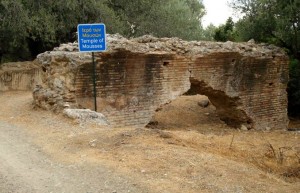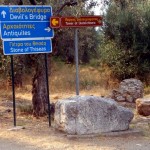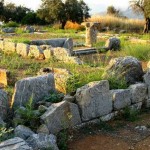According to Greek mythology, Troezen came into being as a result of two ancient cities, Hyperea and Anthea, being unified by Pittheus, who named the new city in honor of his deceased brother Troezen. Troezen was the place where Aethra, daughter of Pittheus, slept with both Aegeus and Poseidon the same night, and fell pregnant with the great Greek hero Theseus. Before returning to Athens, Aegeus left his sandals and sword under a large boulder in Troezen, and requested that when the child was able to prove himself by moving the boulder he must return the items to his father in Athens; Theseus did indeed lift the boulder when he came of age. Troezen is also the setting of Euripides' tragedy Hippolytus, which recounts the story of the eponymous son of Theseus who becomes the subject of the love of his stepmother, Phaedra. While fleeing the city, Hippolytus is killed when his chariot is attacked by a bull rising from the sea. Other plays on the same subject have been written by Seneca and Jean Racine, also set in Troezen. The ancient city also possessed a spring, supposedly formed where the winged horse Pegasus once came to ground.
Η Αρχαία Τροιζήνα ήταν μια πόλη του ελληνικού κόσμου που άκμασε κατά μεγάλες περιόδους, ενώ σε άλλες έπεσε σε δευτερεύοντα ρόλο επισκιασμένη από μεγαλύτερα κέντρα. Είναι βέβαιο εξάλλου ότι διέθετε μια οικονομικά εύρωστη τάξη, η οποία επιδείκνυε τον πλούτο της και συμμετείχε σε πανελλήνιους αθλητικούς αγώνες. Τις ανάγκες μάλιστα αυτής της τάξης εξυπηρετούσε η δημιουργία τοπικού κέντρου παραγωγής χάλκινων αγγείων, τα οποία ήταν δημοφιλή ως κτερίσματα για δύο τουλάχιστον αιώνες. Η Αρχαία Πόλη που είχε τείχη, ακρόπολη, αγορά και πολλά ιερά με εξαιρετικά ευρήματα τα οποία φυλάσσονται στο Αρχαιολογικό Μουσείο Πόρου αλλά και στο Εθνικό Αρχαιολογικό, βρισκόταν στα δυτικά του σημερινού οικισμού.





